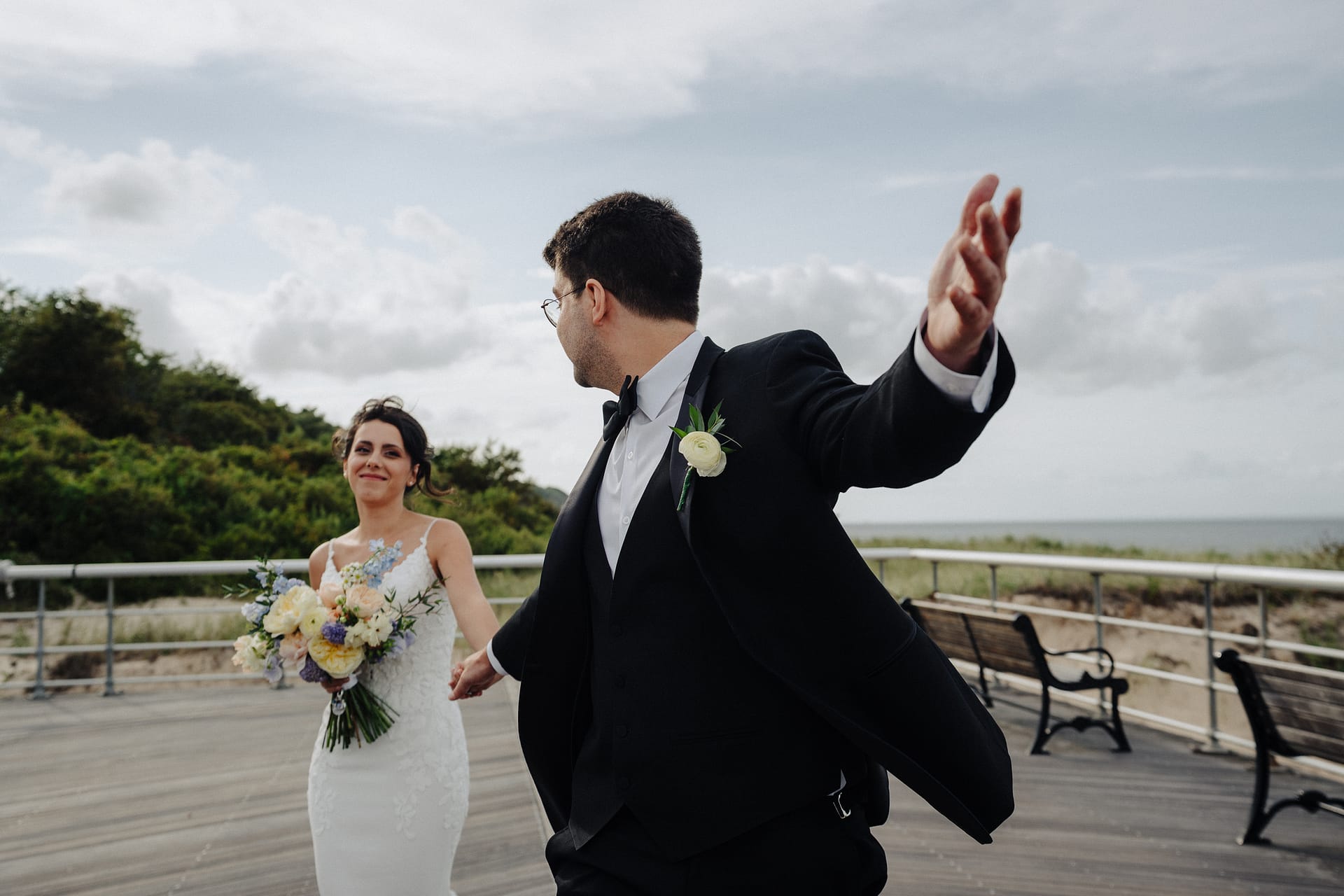Design-forward seaside charm, whitewashed lanes, understated elegance.
Best months: June–Sept.
Search intent hits: ile de ré wedding, la rochelle wedding
How to Plan a Destination Wedding in France:
The Complete Guide
Planning a destination wedding in France or abroad is exciting — and France is hard to beat for châteaux, vineyards, beaches, and timeless cities. This guide walks international couples — especially Americans, UK couples, Canadians, and Australians — through every step: legal vs symbolic ceremonies, when to book vendors, what it really costs, and how to choose the perfect region.
Planning from the U.S. or UK? Most American and British couples complete the civil marriage at home, then host a symbolic ceremony in France. It’s the simplest route and gives full freedom on location, timing, and personalization.

Why Choose France for your Destination Wedding
- Romance & variety: From Paris to Provence, France is synonymous with love.
- Variety of Venues: Châteaux, vineyards, beaches, luxury hotels.
- Cuisine & Wine: French gastronomy is world-renowned and a highlight of any wedding.
- Accessibility: France is well-connected by international airports and high-speed train lines, making it easier for guests to travel.
Step 1: Decide Between a Legal or Symbolic Ceremony
- Legal Weddings: Require residency (40 days minimum) and must take place at a local mairie (town hall). This is paperwork-heavy and time-bound to your commune.
- Symbolic Ceremonies (most common): Legally marry at home in the U.S., UK, Canada, or Australia, then celebrate in France with a personalized ceremony at a château, vineyard, or seaside venue.
Tip: Want a French flavor? Add readings, exchange of vows, and follow with a vin d’honneur (post-ceremony cocktail).
Step 2: Choose the Right Region (Match the Vibe to the Venue)

Île de Ré & La Rochelle (Charente-Maritime)

Bordeaux (Gironde)
Château and vineyard weddings; perfect for wine-centric weekends and welcome dinners under plane trees.
Best months: May–June, Sept–Oct.
Search intent hits: bordeaux chateau wedding, vineyard wedding france, dordogne chateau wedding

Paris (Île-de-France)
Iconic backdrops for destination weddings and Paris elopements; rooftops, galleries, and hôtels particuliers.
Best months: Apr–June, Sept–Oct.
Search intent hits: paris elopement, elope in paris

South of France & the French Riviera (Côte d’Azur)
Glamorous estates, sea views, late sunsets; chic cocktail hours and poolside brunches.
Best months: May–June, Sept–Oct.
Search intent hits: south of france wedding, côte d’azur wedding, french riviera wedding

Provence & the Luberon
Lavender fields, olive groves, golden stone villages; dreamy outdoor dining under string lights.
Best months: May–June, Sept.
Search intent hits: provence wedding venue, provence lavender wedding

Loire Valley
Storybook châteaux with formal gardens and river light; ideal for black-tie.
Best months: May–June, Sept.
Search intent hits: loire valley chateau wedding
Step 3: Set Your Timeline
12–18 months (foundation)
-
Shortlist regions and venues; do virtual/viewing days. Choose and book your venue (sign + deposit).
-
Hire an English-speaking planner (often before or at the same time as the venue).
-
Book your bilingual wedding photographer.
-
Set a working budget & draft the guest list; pick a target weekend and a rain/indoor backup plan.
9–12 months (key vendors & travel)
-
Hold room blocks and identify airport/train routes; plan shuttles.
-
Book catering (if not in-house) and schedule tastings.
-
Book celebrant/officiant, entertainment (band/DJ), and florist/design.
-
Start stationery design; consider a Paris engagement session or venue site visit.
6–9 months (details & design)
-
Send save-the-dates (international guests need flight time).
-
Lock rentals/lighting, preliminary floor plan, and ceremony layout.
-
Menu & wine shortlist; timeline draft with planner.
-
Order attire & schedule fittings; discuss rehearsal dinner and day-after brunch.
4–6 months (run-of-show)
- Finalize photo timeline around golden hour; build family/group shot list.
- Confirm rain/shade plans, power, noise curfew, and late-night transport.
- Approve floral recipe & décor mockups; begin seating chart draft.
2–3 months (confirmations)
- Final tastings; confirm vendor arrival/load-in and certificates of insurance.
- Print day-of materials (programs, menus, escort cards, signage).
- Share master schedule & contact sheet with all vendors.
Week of execution
- Venue walk-through & rehearsal; deliver welcome bags.
- Prep kits (rings, stationery, dress/suit, heirlooms) ready for detail photos.
- Build small weather/time buffers into the schedule.
Many couples complete the legal formalities in the U.S. first and then celebrate their wedding in France with all the style, romance, and emotion — without the paperwork headaches.
Step 4: Budget for a Destination Wedding in France
On average, couples spend €30,000–€80,000 on a French destination wedding.
| Category | Typical Range |
|---|---|
| Château rental (weekend) | €8,000–€25,000+ |
| Vineyard / private venue (day) | €5,000–€12,000+ |
| Catering & wine | €100–€250 per guest |
| Planning (full-service) | €4,000–€12,000 |
| Photography | €3,000–€6,000+ |
| Entertainment (band/DJ) | €1,500–€6,000 |
| Florals & décor | €2,000–€10,000 |
| Lighting & rentals | €1,500–€6,000 |
| Transport (shuttles/cars) | €800–€3,000 |
| Hair & makeup (bridal + select guests) | €600–€2,000 |
| Stationery & day-of print | €400–€1,500 |
| Contingency | Recommend 5–10% |

Step 5: Build an English-Speaking Vendor Team
- Wedding planner (highly recommended): Especially if you don’t speak French; they streamline logistics and vendor comms.
- Bilingual photographer (France-based): Documentary storytelling; comfortable with American & UK traditions (first look, speeches, rehearsal dinner).
- Celebrant/Officiant: English-speaking celebrant for symbolic ceremonies.
- Catering & wine: Regional menus + curated pairings; consider late-night French onion soup service.
- Entertainment: Live band + DJ or hybrid sets for energy all night.
Step 6: Consider Season & Weather (Pick for Light, Not Just Dates)
Spring (April–June):
Mild weather, flowers in bloom.
Summer (July–August):
Popular but hot; book early.
Autumn (September–October):
Beautiful light, vineyards at harvest.
Winter (November–March):
Cozy château weddings, lower costs.
Step 7: Accommodation & Guest Experience
- Reserve hotel blocks or on-site château rooms for guests.
- Share a travel guide: nearest airports, train routes (TGV), and car rentals.
- Plan extra activities: wine tastings, welcome dinners, day-after brunch.
Step 8: Add Signature French Touches
- Champagne tower during the reception.
- Croquembouche (cream puff or profiterole tower) as your wedding cake.
- Vin d’honneur (post-ceremony cocktail) for mingling with all guests.
- Late-night onion soup for dancing fuel.

Step 9: Plan your Photography
- Golden hour portraits scheduled around sunset.
- Space for documentary-style coverage of candid interactions.
- Think about additional sessions: Paris engagement session, rehearsal dinner coverage, or vineyard sunset portraits.

FAQ
How far in advance should we book our venue in France?
Aim for 12–18 months; Riviera/Provence/Paris prime dates go first. See the Timeline for lead times.
Can Americans or UK couples have a legal ceremony in France without residency?
Generally no; most do a symbolic ceremony in France. See Legal vs Symbolic.
What drives the budget most?
Guest count and venue type (château weekend vs day rental). See the Budget ranges.
What is a vin d’honneur and do we need one?
A post-ceremony cocktail reception common in France; great for including more guests without increasing dinner headcount.
Do we need an English-speaking planner or celebrant?Highly recommended for international couples; it streamlines logistics and ceremony flow.
When should we send save-the-dates for a destination wedding?
6–9 months out (earlier is better for flights).
Best months by region, at a glance?
Riviera/Provence: May–Jun, Sep–Oct • Bordeaux/Dordogne: May–Jun, Sep–Oct • Paris: Apr–Jun, Sep–Oct
Can we bring vendors from the US/UK?
Yes, but factor travel/insurance/power. Many couples choose local bilingual pros to reduce costs/logistics.
Do we need permits for Paris photos or outdoor ceremonies?
Sometimes (certain rooftops/parks/private sites). Your planner/venue will advise.
Are tips expected in France?
Not required (service is typically included). Discretionary tips for outstanding service are always appreciated.
Do we need event insurance?
Some venues require liability coverage; your planner can advise local options.
Elopement vs micro-wedding: what’s the difference?
Elopement: usually 0–2 guests with core vendors; micro-wedding: up to ~20 guests.
Why Choose Me as Your Destination Wedding Photographer in France
I’m Wayan Barre, a French-American wedding photographer specializing in destination weddings for U.S. couples in France. After living in the United States for several years, I understand both cultures deeply and offer a smooth, bilingual experience from start to finish.
- Fluent in English and French: Communicate effortlessly throughout the planning process and on your wedding day.
- Experience working with American couples: I understand your expectations and wedding traditions.
- Familiar with U.S. wedding traditions and expectations: I’ll help make everything feel natural and meaningful.
- Currently relocating to France with a focus on weddings in Bordeaux, La Rochelle, and Paris: Well-positioned to offer local expertise and insider recommendations.
- Documentary-style storytelling to capture every emotion naturally, combined with my experience as an internationally published photojournalist: Real, timeless, and emotion-filled images.
I work closely with you to ensure that every part of your wedding feels effortless and joyful — from the planning process to the day itself.


